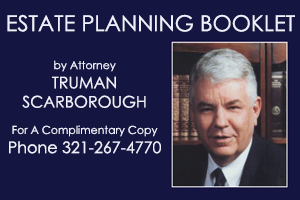When Does Diminished Capacity Prevent A Person From Creating An Estate Plan?
By Attorney Truman Scarborough
Before assisting in the preparation of an estate plan, an attorney must determine that the client has “Testamentary Capacity”. This requires a person understand: 1] the general nature and extent of his/her assets; 2] his/her natural heirs; and 3] the way property will be distributed under the proposed will / trust. To make this determination, the attorney will want to directly discuss these matters with the client, without anyone else’s involvement.
Advanced age or failing memory do not in themselves mean a person lacks testamentary capacity. In fact, everyone is presumed to have testamentary capacity unless declared incompetent by the court. Even after someone is determined to be incompetent by a court, there may be lucid moments with testamentary capacity.
A person may leave property to whomever he/she pleases, but when mental capacity is in question, irregular gifts will be scrutinized. There should be a rationale for major changes in long-standing estate plans, or if normal beneficiaries are excluded or left disproportionally smaller gifts than similar beneficiaries. It is not a matter of whether we agree with the decision, but whether there is a logical and factual basis for the decision.
The question of testamentary capacity is time specific. Mental capacity may fade in and out during the day. What the mental condition was at a different time is not the issue. The question is: Was there testamentary capacity at the time instructions were given to the attorney and when the documents were signed? The test for testamentary capacity is also task-specific. Someone with partially diminished capacity may be able to create a simple Will but not a complex Trust.
The Florida Bar’s Rules of Professional Conduct require attorneys to continue as much as possible working with clients suffering from diminished capacity. It says: “When a client’s ability … is impaired because of mental disability … the lawyer shall, as far as reasonably possible, maintain a normal client-lawyer relationship…” However, an attorney will become reluctant to proceed if the client is disoriented, has difficulty understanding options, or is haphazardly changing his/her mind. A professional mental examination may be requested. While evaluations cannot be used as a final determination of testamentary capacity, they can be very helpful.
Separate from general testamentary capacity is the legal concept of insane delusions. This occurs when someone believes something that is not factually true. A person can possess general testamentary capacity and yet suffer from an insane delusion. If the insane delusion impacts only a portion of the estate plan, only that portion is void.
Even a partial loss of mental capacity can increase the risk of a challenge to the estate plan based on “undue influence”. The law recognizes a person may be persuaded by trusted individuals to do things that he/she would not otherwise do. Although lack of capacity and undue influence are separate issues, the potential for undue influence increases as capacity diminishes.
Under Florida law a Will or Trust is null and void when obtained by “undue influence”. The law presumes there was undue influence anytime the person exercising the influence: 1] substantially gains as a beneficiary 2] occupies a confidential relationship, (like a child or caregiver) and 3] was “active in procuring” the gift, which includes involvement in the preparation of the estate plan.
For further information you may be interested in Attorney Truman Scarborough’s Booklet on Estate Planning in Florida. It is available without charge or obligation by calling (321) 267 – 4770. His office is located at 239 Harrison Street, Titusville, Florida.


Recent Comments